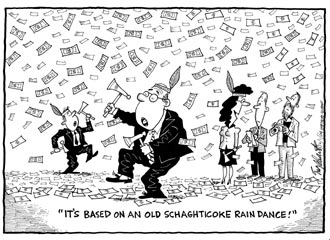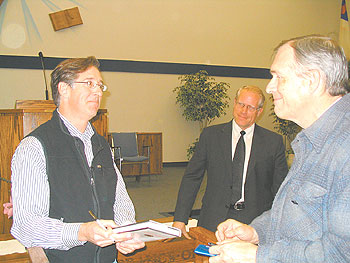 Another Stereotype of the Month entry:
Another Stereotype of the Month entry:
 Another Stereotype of the Month entry:
Another Stereotype of the Month entry:
From the NY Post:
By WALTER OLSON
May 16, 2004 — INDIAN gambling will probably arrive in the Catskills soon, waved in by state budgeters eager for revenue. Let's hope we've learned some lessons from Connecticut's decade-plus experience with Pocahontas-as-croupier, a story told in devastating fashion by Brett Fromson in "Hitting the Jackpot."
The modern story of the Mashantucket Pequots and their Foxwoods casino is by now familiar. After drifting in life, a restless New Englander realizes his Indian heritage might entitle him to housing and other benefits.
Falling in with shrewd lawyers, he realizes that much more is at stake if he and his relatives can succeed in simulating the existence of a functioning tribe. They first outwit Hartford's half-asleep politicos and then maneuver a bill through Congress to secure federal recognition as a tribe without the usual scrutiny.
They proceed to erect the world's largest casino in the woods and the resulting geyser of cash, sprayed judiciously in various directions, buys them many highly placed friends, with enough left to make tribe members very rich indeed. Some of the money winds up going to classes to teach them how to become Indians, since no Pequot traditions survive as to language, crafts, belief or much of anything else.
Veteran financial reporter Fromson documents the series of sharp dealings and bald impostures that carried the day. "Never underestimate the ignorance of your opponents," proclaims the tribe's chief adviser, attorney Tom Tureen. "People are real stupid sometimes." Ideology also played a key role.
Progressive Nutmeg-state lawmakers promoted assertions of Indian identity. Federal judges leaned over to help the presumed underdogs. Liberal local congressman, Rep. Sam Gejdenson, avidly backed the tribe.
As for the tribe's lawyers, who'd emerged from the legal services movement, these oh-so-idealistic attorneys found themselves gradually turning into well- paid casino promoters.
And the lucky Pequots? Few stories are sadder than what happens to the typical sweepstakes winner. Unused to riches, tribal members splurged on BMWs and foreign travel, some borrowing heavily against future income to do so. The tribal government, which made Tyco look Trappist, was soon spending $200,000 per member on services, aside from the casino payroll and large direct cash payments to members. Then the flow of incoming money began to slow.
The tribe eventually shoved aside the founding Haywards from the helm of (as Fromson puts it) "the tribe they had invented." Millionaires or no, the reservation suffers from much crime and domestic abuse.
Fast-paced and well-written, this book has been assailed in some quarters as "anti-Indian," which hardly seems fair, since the folks Fromson is writing about are about as authentically Indian as Camilla Parker Bowles.
Walter Olson is a senior fellow at the Manhattan Institute and author most recently of "The Rule of Lawyers."
HITTING THE JACKPOT: THE INSIDE STORY OF THE RICHEST INDIAN TRIBE IN HISTORY
BY BRETT D. FROMSON
ATLANTIC MONTHLY PRESS, 244 PAGES, $24

Rob's comment
The contest includes several entries on Fromson and his book, so that's old news. But this book review invents or repeats several stereotypes while reviewing the book, including:
A few additional comments:
>> The tribal government, which made Tyco look Trappist, was soon spending $200,000 per member on services, aside from the casino payroll and large direct cash payments to members. <<
Was this really for "services," which sounds like more of the Pequots' alleged efforts to enrich themselves? Or was it for a tribal museum, a tribal newspaper, and other functions that benefit everyone, Indian and non-Indian alike?
>> Millionaires or no, the reservation suffers from much crime and domestic abuse. <<
This would seem to prove what many Indians say: that gaming hasn't solved all their problems, that it's no panacea, that government programs and other efforts are still necessary. Indians aren't the ones perpetuating the stereotype that they're all rich and powerful now. People like Fromson and Olson are.
Related links
The critics of Indian gaming—and why they're wrong
|
. . . |

|
All material © copyright its original owners, except where noted.
Original text and pictures © copyright 2007 by Robert Schmidt.
Copyrighted material is posted under the Fair Use provision of the Copyright Act,
which allows copying for nonprofit educational uses including criticism and commentary.
Comments sent to the publisher become the property of Blue Corn Comics
and may be used in other postings without permission.